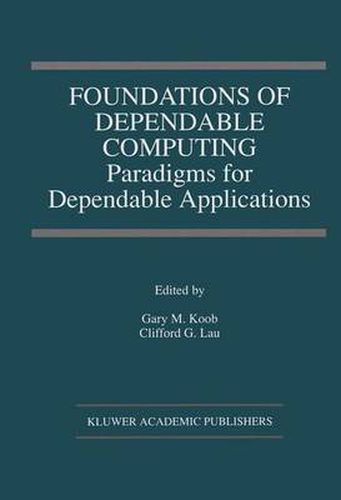Readings Newsletter
Become a Readings Member to make your shopping experience even easier.
Sign in or sign up for free!
You’re not far away from qualifying for FREE standard shipping within Australia
You’ve qualified for FREE standard shipping within Australia
The cart is loading…






This title is printed to order. This book may have been self-published. If so, we cannot guarantee the quality of the content. In the main most books will have gone through the editing process however some may not. We therefore suggest that you be aware of this before ordering this book. If in doubt check either the author or publisher’s details as we are unable to accept any returns unless they are faulty. Please contact us if you have any questions.
Foundations of Dependable Computing: Paradigms for Dependable Applications, presents a variety of specific approaches to achieving dependability at the application level. Driven by the higher level fault models of Models and Frameworks for Dependable Systems, and built on the lower level abstractions implemented in a third companion book subtitled System Implementation, these approaches demonstrate how dependability may be tuned to the requirements of an application, the fault environment, and the characteristics of the target platform. Three classes of paradigms are considered: protocol-based paradigms for distributed applications, algorithm-based paradigms for parallel applications, and approaches to exploiting application semantics in embedded real-time control systems.
The companion volume subtitled Models and Frameworks for Dependable Systems presents two comprehensive frameworks for reasoning about system dependability, thereby establishing a context for understanding the roles played by specific approaches presented in this book’s two companion volumes. It then explores the range of models and analysis methods necessary to design, validate and analyze dependable systems.
Another companion book (published by Kluwer) subtitled System Implementation, explores the system infrastructure needed to support the various paradigms of Paradigms for Dependable Applications. Approaches to implementing support mechanisms and to incorporating additional appropriate levels of fault detection and fault tolerance at the processor, network, and operating system level are presented. A primary concern at these levels is balancing cost and performance against coverage and overall dependability. As these chapters demonstrate, low overhead, practical solutions are attainable and not necessarily incompatible with performance considerations. The section on innovative compiler support, in particular, demonstrates how the benefits of application specificity may be obtained while reducing hardware cost and run-time overhead.
$9.00 standard shipping within Australia
FREE standard shipping within Australia for orders over $100.00
Express & International shipping calculated at checkout
This title is printed to order. This book may have been self-published. If so, we cannot guarantee the quality of the content. In the main most books will have gone through the editing process however some may not. We therefore suggest that you be aware of this before ordering this book. If in doubt check either the author or publisher’s details as we are unable to accept any returns unless they are faulty. Please contact us if you have any questions.
Foundations of Dependable Computing: Paradigms for Dependable Applications, presents a variety of specific approaches to achieving dependability at the application level. Driven by the higher level fault models of Models and Frameworks for Dependable Systems, and built on the lower level abstractions implemented in a third companion book subtitled System Implementation, these approaches demonstrate how dependability may be tuned to the requirements of an application, the fault environment, and the characteristics of the target platform. Three classes of paradigms are considered: protocol-based paradigms for distributed applications, algorithm-based paradigms for parallel applications, and approaches to exploiting application semantics in embedded real-time control systems.
The companion volume subtitled Models and Frameworks for Dependable Systems presents two comprehensive frameworks for reasoning about system dependability, thereby establishing a context for understanding the roles played by specific approaches presented in this book’s two companion volumes. It then explores the range of models and analysis methods necessary to design, validate and analyze dependable systems.
Another companion book (published by Kluwer) subtitled System Implementation, explores the system infrastructure needed to support the various paradigms of Paradigms for Dependable Applications. Approaches to implementing support mechanisms and to incorporating additional appropriate levels of fault detection and fault tolerance at the processor, network, and operating system level are presented. A primary concern at these levels is balancing cost and performance against coverage and overall dependability. As these chapters demonstrate, low overhead, practical solutions are attainable and not necessarily incompatible with performance considerations. The section on innovative compiler support, in particular, demonstrates how the benefits of application specificity may be obtained while reducing hardware cost and run-time overhead.